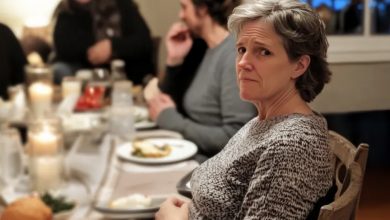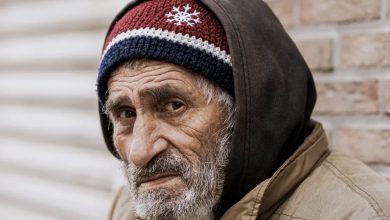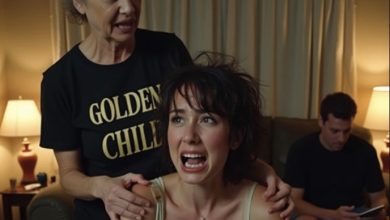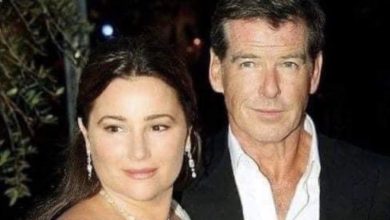“From Shattered Glass to Courtroom Victory: The Widow Who Fought Elder Abuse and Won”
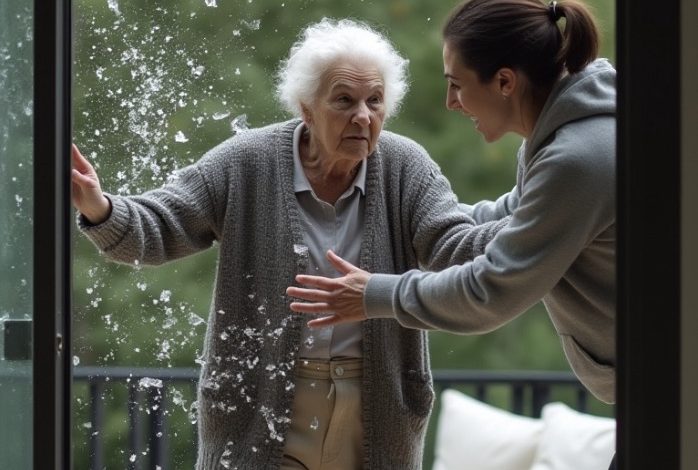
I drove back to my estate expecting a calm, restful holiday. I imagined quiet mornings, the slow work in my workshop, and the roses in the garden needing a little tending. Instead, I found my daughter-in-law Sierra and her whole family in charge. The lawn was a mess, loud music rattled through the rooms, and strangers lounged around the house my husband and I had built together.
Sierra stood on the patio when she saw me. She looked nothing like the placid, smiling woman I sometimes saw in photos. Her face was made hard by anger and a kind of sharp cruelty. “Get out,” she shouted. “This is my house now, you useless freeloader.”
Her words hit me like a fist. I’m Helen Thorne. I’m a widow. My husband Edward and I worked for years to build this place. Every tile, every beam, every rose was tied to our life. For decades I sewed, mended, and saved so we could make this home. To hear his work and my years called “wasted space” felt like a theft of memory.
I tried to stay calm. “This is my home,” I said, my voice small. “I came to check on the place.”
Sierra laughed, a harsh sound that made my blood run cold. “Robert said we can use this whenever we want. It’s wasted when no one’s here.” She moved closer, like a cat circling its prey. Her voice dropped to a low hiss: “You need to go. There is no room for you here.”
Then she shoved me.
At seventy-five my body is not what it used to be. I stumbled back and slammed into the glass patio door that led into my workshop. The pane blew apart with a terrible crash. Glass rained into the room and onto the floor. I stood there for a moment, stunned, a small cut on my temple already bleeding. The sound of breaking glass felt like the sound of my life being broken.
My son Kevin finally came outside. But he did not rush to me, did not ask if I was hurt. He only looked toward the house with a guilty, anxious expression. “Mom,” he mumbled, “you have to go. You’re upsetting Sierra and the kids.”
Her audacity emptied the last of my patience. I felt all the motherly forgiveness drain away. I turned my back on Kevin. Words had stopped mattering. Only action would count now.
I left the hacienda, but not in shame. I drove to the small house on my friend Grace’s property on the edge of town—the little place I kept for peace and for work. It had once been a project of mine, built with my own hands, and it was quiet and safe. Once there, I sat at the table and thought clearly. This was not an accident. It was not a misunderstanding. It was planned.
Kevin’s strange behavior, the missing watch from the mantle, Sierra’s words—everything hinted at more than rudeness. I called Grace. She had been a lawyer before she retired. She listened without surprise, then gave me a name: David Chen, a lawyer who handled elder financial abuse and fraud. “Call him right away,” she said. “This sounds deliberate.”
David was sharp and direct. He asked precise questions about ownership, titles, and whether I had ever signed away power of attorney. He wanted to know if any items had gone missing. When I told him about Edward’s chronometer—a special watch that had been in our family for years—he grew quiet. “Keep that detail,” he said. “It points to theft.”
He told me to secure everything. Freeze accounts, change passwords, and look for strange bank movements. If Sierra and Kevin were trying to force me out, they might already be making moves on paper.
I started checking accounts. I know how to handle money; Edward and I had balanced bills together for decades. Almost immediately I found odd things. A large, steady payment had been set up to a clinic in Las Vegas labeled vaguely as a “consulting fee.” There was a request for a notarized copy of Edward’s death certificate. And someone had tried to change the beneficiary on one of Edward’s old life insurance policies.
This was not just a party. They were steering the house, and my rights, toward theft.
David set a plan in motion. He had an investigator named Alexa start digging into Sierra and Kevin’s finances and online posts. She found plenty: late rent in Los Angeles, maxed cards, and posts showing the glossy life that was not real. She also found a private message where Sierra bragged about “getting the house” and paying someone to make a claim that I was mentally unfit to handle my affairs. She mentioned a “Dr. Sanchez” and said the plan was to get a medical opinion that would help remove me from control of my estate.
That message made my stomach drop. They were not only using force and lies. They planned to attack my mind to take everything.
We moved fast. David filed for a temporary restraining order and for emergency protection against elder abuse. He also arranged for evidence to be preserved. Alexa pulled security footage and saved screenshots. She found proof that some tools and fixtures were being removed from the workshop. Marcus, a friend from the woodworking community and a former Marine, drove out and recorded clear photos of Sierra trying to remove a chandelier and shove tools into trash bags.
Everything pointed to one picture: a planned takeover.
When the TRO was served the next morning, Sierra tried to argue and post on social media. She put up a staged video crying about being “robbed” by a mean mother-in-law. Her followers sent angry messages. But Alexa and David were ready. They posted evidence of Kevin’s debts, screenshots of Sierra’s private messages, and Marcus’s photos. The story shifted.
Then we found the Mustang. Edward had always been careful; he hid things well. In the trunk of his old ’67 Mustang I found a small metal box hidden under the lining. It took a key from the sun visor to open it. Inside were papers and a USB drive. On the drive was a short video recorded by Edward just days before he died.
In the video Edward spoke directly to me. He said he feared people trying to take advantage of my good heart. He warned that someone close might try to manipulate Kevin and move to take our house. More than that, he told me plainly that he trusted my judgment, that I was neither weak nor unfit to manage our home. He recorded facts about our property and left instructions.
I watched the video with my hands shaking. David smiled for the first time in weeks. “This is the kind of evidence courts pay attention to,” he said. “It’s direct, it’s personal, and it undermines any claim that you are mentally incompetent.”
The hearing was set. Sierra’s lawyer tried to build a case showing I was unstable. He had arranged for Dr. Sanchez to give an opinion by remote consultation and to argue that I suffered from severe trauma and could not handle finances. But David had done his homework. He found that Dr. Sanchez had a suspended license and had taken large payments for remote reports. The judge listened as David methodically showed why Dr. Sanchez’s testimony was unreliable.
Then David played Edward’s video in court. The room grew very quiet. Every word from Edward cut through the fake story. Sierra’s face went white. Kevin looked down at his hands. The judge could see the real danger in what they had done.
The judge’s ruling was decisive. The court found Sierra and Kevin had engaged in elder abuse and attempted fraud. The temporary restraining order became permanent. I was affirmed as the sole owner of the hacienda. The court ordered them to return stolen items and to pay for legal fees and damages.
After the ruling Sierra screamed and stormed out. Kevin stayed behind, broken and ashamed. He whispered an apology—one that came late but was still a kind of truth. I answered him simply: “You chose. You walked away when I needed you.”
The legal victory was not the end of the story, but it was a turning point. I sold some pieces of the property and used the funds to restore the workshop and the garden. I moved back when things were ready, and friends from the woodworking community came by to help put tools back where they belonged. Marcus came by with a truckload of things he had saved. Grace sat with me on the porch and we talked until the sun went down, talking not just of the past but of how to spend the future.
I also used what we had learned to help others. I started a small trust and a local support group for older people who were at risk of financial abuse. I wanted women like me to have a place to turn, and to know that they could fight back. Monies from the court settlement helped create a fund for emergency legal fees.
The harshest part of the whole affair wasn’t the courtroom or the threats. It was how easily a life could be rearranged by a few lies and a slow erosion of trust. I learned to guard my documents and to keep a closer eye on things. I stopped assuming loyalty came without asking. I stopped giving away trust too quickly.
Edward’s last message had not only protected our legal claim; it also reminded me of who I was. I was not merely a widow with memories. I was a woman who had built a home with her hands, who had kept a family going through hard times, and who could, when necessary, stand up and protect what was hers.
Walking back into the workshop, touching the familiar tools, smelling wood and oil and sawdust, I felt complete again. The house was mine. The roses would bloom. The workbench would fill with new projects. I would live on, not as a victim, but as a witness to what can happen and a defender for those who might be next.
The war had been hard, and I had not wanted it. But in the end, I had fought smart, not only for myself but for the truth. I had turned pain into protection, and in doing so I reclaimed my life, my name, and my home.



